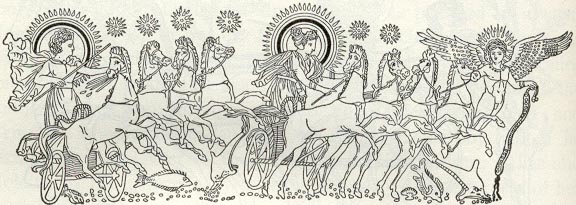![]()
Masterpieces of Western Literature
| Unit 6 |
|
English 201:
Masterpieces of Western Literature |
| .Unit 6 Reading | Course Reading | Entry Page |
| Introduction | Background | .Explication | Questions | Review |
Fame:
In Christian theology humility is a virtue. Fame is either irrelevant
(to salvation) or an obstacle related to original sin (putting your "self"
before God). On the other hand, fame has some relationship to good
works, stewardship, & perhaps being helpful to your neighbor.
It is somewhat surprising to find that Dante doesn't find a room or trench
in hell occupied by the proud. In the section dealing with "painted
people" (hypocrites), Dante suggests something that would have been familiar
to Homer, viz., that fame works as an instrument to distinguish genuine
accomplishment from pretension, hypocrisy, & illusion. Virgil
admonishes Dante:
24.46 Now you must
free yourself from sloth . . .
for, sitting on down
or lying under covers, no one comes to fame,
without which whoever consumes his life
leaves such vestige of himself on earth
as smoke in air or foam on water.
Here is how fame works in Homer. Warriors & other men of accomplishment
gossip with each other, trading life stories. In the section of the
ODY
that we study in this unit (books 9-12), Alkinoos, having hosted OD &
agreed to help reach home, asks only for OD's story:
9.596 tell me
the sea ways that you wandered, & the shores
you touched; the cities, & the men therein
After hearing someone's life story, we take an attitude towards that
person. He has gained our respect or our contempt, or perhaps just
our indifference. Occasionally we envy someone of great talent &
accomplishment, wishing that we were as fortunate or blessed; perhaps even
wishing that we could trade lives. Such feelings implicitly recognize
that I envy the person that I perceive as superior to me. OD has
listened to innumerable such stories & never found a person with whom
he would trade places. Consequently, OD must be content with his
life. Is blissfully happy all the time. You know that he is
not. However, OD must feel that he has gotten everything out of life
that it is possible to get, because he cannot find anyone who has gotten
more.
This negative definition of "the good life"
identified through fame is related to Socrates' status as the wisest human
being. Initially Socrates believes that the Oracle of Delphi was
mistaken about this, feeling that:
p.946 I know
that I have o wisdom, small or great. . . . I reflected that if I
could only find a man wiser than myself, then I might go to the god
with a refutation (Apology).
In his search, Socrates finds again & again that the people he quizzes
about various virtues think that they possess absolute truth, but
they invariably end up confused & flustered, blaming Socrates for destroying
their illusions:
p. 946 although I do not
suppose that either of us knows anything really beautiful &
good, I am better off than he is,--for he knows nothing, & thinks that
he knows;
I neither know nor think that I know. In this latter particular,
then, I seem to have
slightly the advantage of him.
Paradoxically, Socrates' wisdom is negatively defined as the absence
of pretension & the willingness to rationally analyze every belief.
Somewhat similarly, OD's "perfect" life remains troubled. Like Sisyphos
(11.668), & like every human being, OD must struggle every day that
he lives, for that is what life is: a struggle. The point is that
OD conducts this struggle best, being:
13.369 Of all men now alive
. . . the best in plots & story telling
OD is the prototype of Socrates, both being entirely devoted to analytic thinking, to Athena.
Teiresias:
Kirke tells OD that he must go to Hades in order to solicit the advice
of Teiresias about what life means & how to get home (i.e., how to
get through life successfully). The question is why does Teiresias
possess the answers? Who was he? Perhaps you remember him from
reading Sophocles. Teiresias (also spelled Tiresias) appears in both
Oedipus
Rex & Antigone (both in our text). In both plays,
Teiresias is wiser than the tragic heroes whose tragedies are evident in
their arrogance. Oedipus solved the riddle of the Sphinx & Creon
settled a civil war. Both kings believe that they know more than
anyone else. Look up Tiresias in your Dictionary. You will
find that a good deal of Teiresias' vaunted knowledge comes from his unique
experience of having been both a man & a woman. Hera blinds Teiresias
for having blabbed the secret that if sexual pleasure was constituted of
10 parts, women possess 9 parts & men only 1 part. Homer simply
says that:
10.533 blind Teiresias
of Thebes [is] forever
charged with reason even among the dead;
to him alone, of all the flitting ghosts,
Persephone has given a mind undarkened
Teiresias' name means "the weariness of rowing," which is a Greek euphemism for life itself. What does life feel like? It feels like the weariness of rowing that never seems to end. To ask Teiresias about life is concomitant to asking him "what is the meaning of suffering"; why are we fated to suffer? The man who has also been a woman should be uniquely qualified to know the answer. So what is the answer? Read p. 407 closely & explain to us in the Chat session how Teiresias answers this most fundamental human question.
Hospitality: This concept is simple.

Click on the next section: Explication
above.